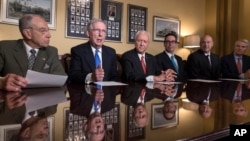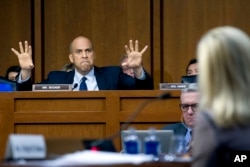A bipartisan group of senators pushing legislation to protect special counsel Robert Mueller's job are trying to win over reluctant Republicans ahead of a crucial committee vote.
The Senate Judiciary Committee was expected to vote Thursday on the bill, which would give any special counsel a 10-day window to seek expedited judicial review of a firing. Two Republicans and two Democrats introduced it earlier this month as President Donald Trump publicly criticized Mueller, who is investigating potential ties between Russia and Trump's 2016 campaign as well as possible obstruction of justice by the president.
The bill has divided Republicans, with a handful supporting the legislation and most opposing it, arguing that it is unconstitutional or unnecessary. Senate Majority Leader Mitch McConnell, R-Ky., has argued that Trump won't move to fire Mueller and has insisted he will not hold a full Senate vote on the legislation.
If Republicans support the bill, some may be at risk of angering Trump and some of his supporters they represent. But the four lawmakers who wrote the bill - GOP Sens. Thom Tillis of North Carolina and Lindsey Graham of South Carolina and Democrats Chris Coons of Delaware and Cory Booker of New Jersey - are hoping to win enough bipartisan support to move it out of committee. Then, they say, they could try and find enough support in the full Senate to persuade McConnell to change his mind.
The bipartisan group has been negotiating in recent days with Senate Judiciary Chairman Chuck Grassley, R-Iowa, who had floated an amendment that included increased reporting to Congress by the special counsel.
Democrats had initially opposed Grassley's amendment, saying it could undermine the investigation if the special counsel had to reveal too much to Congress. But a revised Grassley amendment released Wednesday evening appeared to be a potential compromise, dropping a section that would have required the special counsel's office to report to Congress if the scope of the investigation changed during the investigation. The revised amendment would only require that reporting after the investigation was done.
Republicans opposing the bipartisan bill are expected to vote for an alternative resolution that would express a ``sense of the Senate'' that Mueller should be left alone to do his job.
Texas Sen. John Cornyn, the No. 2 Republican in the Senate and a member of the Judiciary panel, endorsed that idea Wednesday, saying it had a more realistic chance of passing than the bipartisan bill. He is expected to propose the resolution at Thursday's vote.
The resolution "may be a way forward because it avoids the unconstitutionality issue on a bill that the president won't sign and the House won't pass,'' Cornyn said. "So that may be a place for us to land, because, as I have said, I think it would be a mistake'' for Trump to fire Mueller. He added, "I think if we can come to some common ground on a resolution that may be the way forward.''
Trump's legislative director, Marc Short, said in a broadcast interview Sunday that "as far as I know, the president has no intention of firing'' either Mueller or Deputy Attorney General Rod Rosenstein, who oversees Mueller's investigation. Short said he couldn't rule it out in the long term, though, because it's not known "how far off this investigation is going to veer.''
The bipartisan group of four senators introduced two separate bills last August when Trump first started to criticize Mueller publicly. That legislation stalled for months, but was revived and the two bills were combined two weeks ago as Trump fumed about a raid of his personal lawyer's office, in an investigation overseen by federal prosecutors in New York.
After the raid, Trump said the Mueller investigation is "an attack on our country'' and is "corrupt.''








